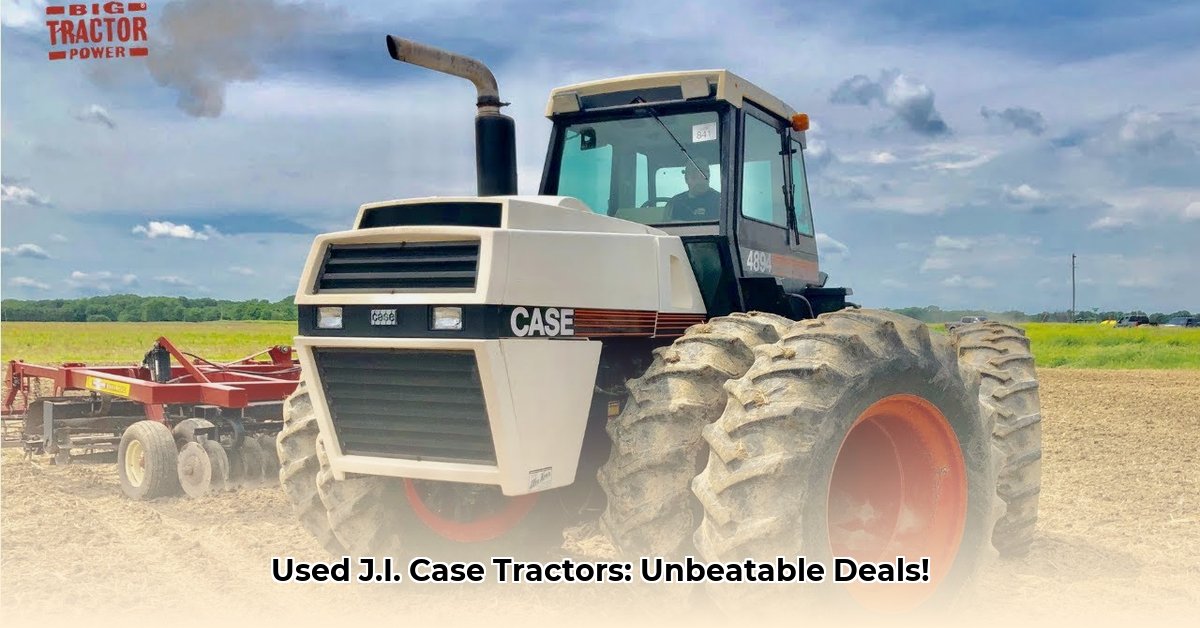
J I Case Tractors: Navigating the Used Market for the Best Deals
Finding the right used J I Case tractor can feel like a treasure hunt. But with the right knowledge and approach, you can find a reliable workhorse at a great price. This guide will walk you through the key factors influencing used Case tractor pricing and provide actionable advice for buyers, sellers, and collectors. For comparisons, check out other brands like John Deere here.
Decoding the Used J I Case Tractor Market: More Than Just Horsepower
The used J I Case tractor market is diverse, featuring classic high-horsepower models and newer, technologically advanced machines. Prices vary significantly, impacted by more than just age and horsepower. Think of it like buying a used car – the year and engine size are important, but overall condition and features greatly affect the final price.
Consider John, a farmer seeking a dependable tractor. He chose a well-maintained 1980s Case 2090 over newer models. Why? The simpler mechanics and renowned power of the 2090 offered better value than newer, more technologically advanced options. This illustrates a common theme: older, high-horsepower Case tractors often retain surprising value. However, a basic J I Case 300, while less expensive, serves a different purpose and is better suited for lighter tasks. Defining your needs before beginning your search is crucial.
Key Factors Influencing J I Case Tractor Prices
Several key factors interact to determine the price of a used J I Case tractor.
Model Year and Horsepower: Older, high-horsepower models (e.g., 1970s and 1980s) often hold their value well due to their robustness and desirability. Newer models typically depreciate faster. However, this is not universally true; some older models may be less valuable due to obsolescence. Isn't it surprising how much value some older models still command?
Condition: A meticulously maintained tractor will command a premium. A well-cared-for tractor is a solid investment regardless of age. While operating hours give some indication of use, reporting on this varies widely, making comparisons challenging. Therefore, a thorough pre-purchase inspection is crucial to identify potential repair costs.
Features: Features like front-wheel drive (MFWD), a front-end loader, and a powerful power take-off (PTO) increase value significantly, broadening the tractor's versatility and efficiency. Do these features justify the higher price tag?
Location: Regional demand influences prices. High demand in a specific area will likely result in higher prices. This factor is harder to predict without regional market analysis.
Navigating the Data Maze: Challenges and Solutions
Online marketplaces are helpful but present challenges. Inconsistent data, particularly regarding operating hours, is common. Many listings lack transparency, making comparisons difficult. A multifaceted approach is necessary: explore private sellers, local independent dealers, and network within agricultural communities.
Actionable Advice: Tips for Buyers, Sellers, and Collectors
This table provides actionable advice for different stakeholders:
| Stakeholder | Short-Term Strategy | Long-Term Strategy |
|---|---|---|
| Buyers | Thoroughly compare prices, conduct comprehensive inspections, negotiate firmly, seek expert advice. | Track market trends; consider specialized training on older tractor models and maintenance. |
| Sellers/Dealers | Provide accurate descriptions, transparent pricing, highlight condition, offer warranties. | Invest in standardized data reporting and high-quality photography; build strong customer relationships. |
| Collectors | Focus on rare models; prioritize preservation and restoration. | Network with other collectors; consider professional appraisals; anticipate long-term value appreciation. |
Finding Your Perfect J I Case Tractor: A Step-by-Step Guide
Define Your Needs: Determine the tasks your tractor will perform to establish necessary horsepower and features.
Research: Compare prices and specifications from multiple sources. Consider potential maintenance costs.
Inspect: Arrange a thorough inspection, ideally with a qualified mechanic.
Negotiate: Negotiate the price effectively based on your research.
Finalize: Secure funding and complete the transaction professionally.
Buying a used J I Case tractor is a significant investment. Thorough research, careful consideration, and a pragmatic approach will ensure you find the perfect machine for your needs.